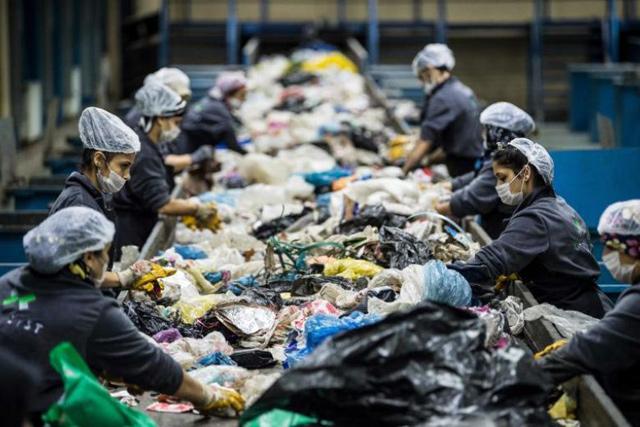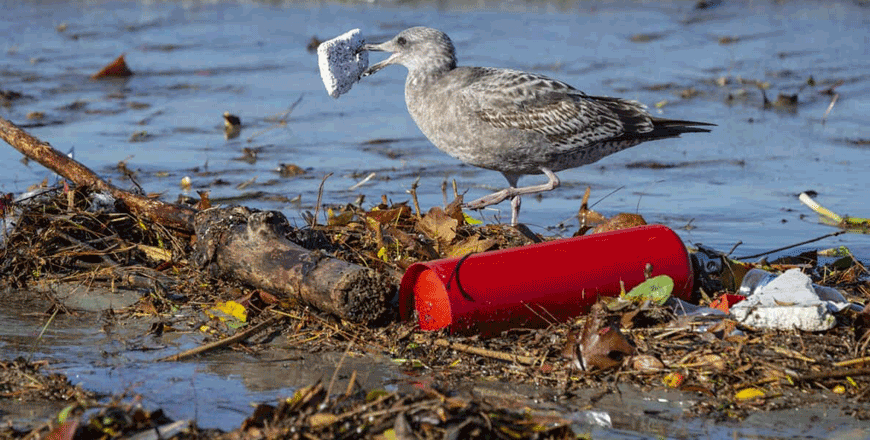You are here
UN urged to tackle plastic trash 'epidemic' with treaty
By AFP - Feb 28,2022 - Last updated at Feb 28,2022
NAIROBI — The UN on Monday launched a global effort to forge a landmark treaty curbing plastic pollution , an "epidemic" with escalating costs for the environment and human health.
More than 100 nations are expected to agree a blueprint for a treaty on plastic waste during three days of in-person talks in Nairobi and virtual deliberations.
The UN's paramount body for the environment heard that plastic had now been found on the remotest beaches, in the air and soil, and within tiny fish and the human bloodstream.
"Plastic pollution has grown into an epidemic of its own," said Norway's climate and environment minister, Espen Barth Eide, who chairs this week's UN Environment Assembly (UNEA).
A legally-binding treaty to combat the crisis would be the greatest coup for the planet since the 2015 Paris climate agreement, said UN Environment Programme (UNEP) chief Inger Andersen.
"The world is watching to see what member states will do over the next few days," Andersen told the assembly.
Greenpeace Africa said plastic trash was "a deadly ticking time bomb" and a global response commensurate to the scale of the problem was "not only critical but non-negotiable".
International negotiators thrashed out a draft treaty framework in the days leading to the UNEA, the world's highest-level decision-making body for the environment.
UN member states in Nairobi are expected to adopt a resolution by Wednesday that would create an intergovernmental negotiating committee to finalise the agreement.
That process could take another two years at least.
Andersen said there was a groundswell of public support for action on plastic and it was critical that nations delivered on expectations.
“A huge responsibility sits on our shoulders,” Andersen said.
Eide said he was “quite optimistic” UN members would reach a strong consensus, despite verbal exchanges on the assembly floor between EU and Russian delegates over the invasion of Ukraine.
“In times like these, it is actually particularly important that the multilateral system shows that it can deliver,” he said.
“This situation should not preclude us continuing the very important work to really act for nature.”
Governments have been under pressure to support a treaty that targets pollution along the entire plastic life cycle, from its source as a raw material chiefly made from oil and gas, to its sustainable use, recycling and safe disposal.
Andersen said the draft before UN member states addressed this aspect, as well as demands that a treaty be legally binding, contain a monitoring mechanism, and enshrine financing for poorer countries.
“With such broad support from governments, business and civil society we expect UNEA to adopt a decision that confirms there will be a robust and legally binding treaty,” said Eirik Lindebjerg from the global conservation group WWF.
Some plastic makers have expressed general support for a treaty but resisted calls for production caps or the phasing-out of certain single-use items.
Less than 10 per cent of the 460 million tonnes of plastic produced in 2019 was recycled, according to the OECD, with most ending up in landfill or the oceans.
By some estimates, a garbage truck’s worth of plastic is dumped into the sea every minute, often transported by rivers.
Large pieces of plastic are a notoriously peril for sea birds, whales and other marine mammals. But at the microscopic level, particles of plastic can also enter the food chain, eventually joining the human diet.
Related Articles
ISTANBUL — Turkish woman Tulay Gercek stands in front of a vending machine at a busy Istanbul metro station but instead of putting coins int
JAKARTA — Indonesia said on Tuesday it would send more than 210 tonnes of garbage back to Australia, as southeast Asian nations push back ag
PARIS — Plastic pollution in the world’s oceans has reached “unprecedented levels” over the past 15 years, a recent study has found, calling














